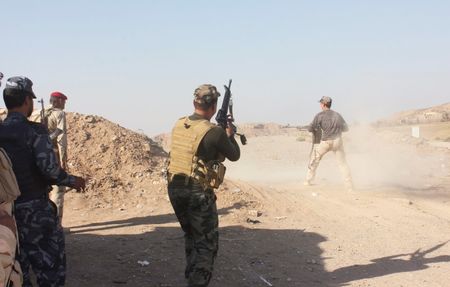By Ahmed Rasheed
BAGHDAD (Reuters) - Iraqi security forces said they advanced to within 2 km (1.2 miles) of the city of Baiji on Wednesday in a new offensive to retake the country's biggest oil refinery, besieged since June by Islamic State militants.
Backed by Shi'ite militias and army helicopters, government forces have swept through a desert area to the west of Baiji, aiming to recapture the city 200 km (130 miles) north of the capital.
They hope to cut off supply lines to militants encircling the refinery and gain control of a road leading to Mosul, the biggest city in the north, an army colonel told Reuters.
Islamic State fighters seized the city of Baiji and surrounded the sprawling refinery in June during a lightning campaign through northern Iraq. The group also controls a swathe of territory in neighbouring Syria and has proclaimed a caliphate straddling both countries.
Government forces inside the refinery complex have been surrounded by the Sunni insurgents who have failed to take it despite frequent attacks and suicide bombings.
The Iraqi government and its allies from the autonomous Kurdish region have been advancing to recapture territory in the north in recent weeks, aided by air strikes from a U.S.-led coalition against Islamic State targets in both Iraq and Syria.
"We have made good advances. We have taken over six villages and now we are only 2 km away from the city of Baiji," said the colonel, who requested anonymity.
Islamic State has used roadside bombs and snipers to slow down the government forces' progress.
"Since yesterday morning we have defused 300 roadside bombs planted by the terrorists to delay our advance," the colonel said.
The Baiji refinery was producing around 175,000 barrels per day before it was closed, a senior Iraqi official said in June. Iraq's domestic daily consumption is estimated at 600,000-700,000 bpd.
Iraqi security forces said they had gained momentum elsewhere over the last week, retaking the Euphrates river town of Jurf al-Sakhar, just south of Baghdad, one of the places where the insurgents have come closest to the capital itself.
Government troops also retook parts of the Himreen Mountains overlooking Islamic State supply lines north of the capital, said another army colonel.
These accounts of government advances could not immediately be independently confirmed.
The gains have not eased violence across the country, which is at its worst since the 2006-2007 peak of the sectarian civil war that took place under U.S. military occupation.
The government hopes to persuade Sunni tribes to turn against Islamic State fighters, as tribes did against al Qaeda during the U.S. "surge" campaign of 2006-2007.
About 35 members of a prominent Sunni tribe in western Anbar Province were rounded up and executed by Islamic State in the Euphrates town of Hit on Wednesday, said local governor Naji Arrak and provincial council chairman Sabah Karhut.
Still, many Sunnis remain hostile to the Shi'ite-led government, accusing Shi'ite militias of kidnapping, torturing and killing members of their minority sect with impunity. Shi'ite militias deny committing atrocities and say they are tracking down Islamic State militants living among Sunnis.
In other violence on Wednesday, roadside bombs killed four people in and around Baghdad and a police major was assassinated in the western part of the capital by a bomb attached to his vehicle, police and hospital sources said.
Iraqi Kurdish fighters known as peshmerga have also been battling Islamic State in the north, where they have made progress backed by U.S. air strikes.

The Iraqi Kurds have sent fighters to Turkey to help Kurds in Syria defend the border town of Kobani from Islamic State fighters there.
(Writing by Michael Georgy; Editing by Peter Graff)
